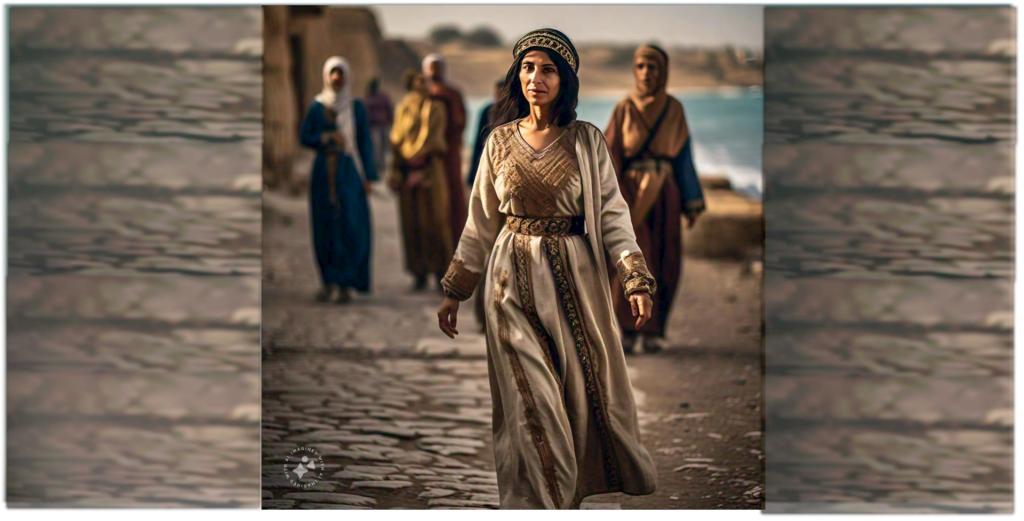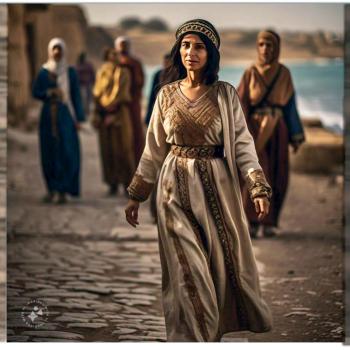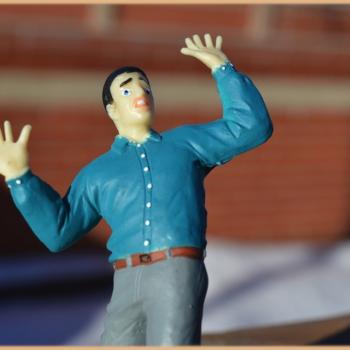Chapter 3: Conflict
 Judith image by Meta, enhanced by Dorian Cole
Judith image by Meta, enhanced by Dorian Cole
The afternoon sun cast long shadows as the group reached the outskirts of Tyre. The city, a bustling metropolis of commerce and culture, lay nestled against the Mediterranean. At night, its lights twinkled like stars reflected in the water.
Exhaustion mingled with anticipation as they entered the city gates. The clamor of voices, the pungent aroma of spices, and the vibrant tapestry of sights and sounds overwhelmed Judith’s senses. She felt a strange sense of belonging she hadn’t felt since her boys left home, as if she had finally found her place again in the world. It was comfortable.
She led the group through the labyrinthine streets, their destination a small, unassuming house tucked away in a quiet corner of the city.
Her sister threw her arms around her, cast a questioning eye at her friends, and invited them inside. Inside, the comforting scent of bread filled the house.
“These are my friends who I traveled with on the road,” Judith waved her arm at them. “They welcomed me.” Her sister, Esther, welcomed the newcomers with open arms, their faces lighting up with joy.
Esther’s husband, James, remained seated, evaluating the guests with a suspicious eye.
Simon went to him and extended a hand. “We were happy to escort Judith to your home. If you will allow us to stay the night, we will leave in the morning. Perhaps we can have some interesting conversation.”
As her husband hesitated, Esther said, “Yes, of course. Please have a seat at our table.”
“What kind of conversation?” James asked.
“We’ve traveled widely, so we know a lot about different areas. We talk about religion with those who are interested,” Simon replied.
“I have all the religion I need,” James said gruffly. “Trying to please one God is enough for anyone. So keep your religion talk to yourself.”
“Let them talk,” Esther said. “It will make the evening more interesting.”
Judith, who couldn’t keep her face from beaming, said, “They talk about Jesus. I- “
James cut her off. “That Jewish prophet who spoke like he was on first-name terms with God, calling him daddy? I hate Jews. They’re stuck-up imbeciles who think they know everything about God and consider others pieces of dung. I don’t want to hear anymore.”
Judith slunk down in her bench and her face lost its smile.
“Who do you people think you are, anyway?” James demanded. Isn’t there enough religion in the world without adding more? Are you not already occupied with your ceremonies, meals, worshiping, and sacrifices at the Temple? Adding more prophets and their demands seems extremely burdensome.
Jacob, who had remained straight faced and silent, said, “Jesus made life a lot simpler for us. We want to do the same for others.”
“Humph,” James said. “Jews only make things complicated.”
“Well,” Rachel began. “I don’t want to argue, but I’ll point out that to talk to Beelzebub, you have to find an oracle who contacts him. But we talk directly to God and ask for whatever we wish.”
James banged the table and shouted, “I don’t want some god hanging around. When I want a god, I’ll go find him and offer a chicken sacrifice to the oracle so he will hear me!”
Judith said, “Beelzebub is god of Hades. His sacrifices attract flies. Jesus is from the God of the living, and no sacrifice is required.”
“Yeah, and Jews have been praying for a savior to chase off the Romans and previous occupiers for five hundred years. Where has that gotten them? They have zealots who only stir up trouble for them.”
“Jesus doesn’t represent them,” Sharon said. “He represents individuals.”
“Well, he’s dead,” James thundered as he bashed the table again.
Jacob glanced at his wife. “We believe he lives on in spirit and helps us.”
“Do a miracle. Get me a bucket of money and I’ll believe he really helps you,” James said sarcastically.
“He helps with our relationships. The world is a better place,” Simon said.
“Look around you!” James said with hostility. “Does the world look like it’s a better place!”
“It feels better,” Judith said.
James looked at Judith with deep consternation. “I suppose you believe this nonsense.”
Judith nodded. “I think so.”
“Well, make up your mind. No one in my house is following this Jesus corpse.”
Judith looked at the group she traveled with. They looked at her with a warm smile. “Can I go with you? I want to know more.” They all nodded in the affirmative. Judith picked up the bag she had set down only minutes ago and headed for the door.
Esther was fading from view into a doorway, sad and embarrassed.
Judith felt bad for her sister. Men reigned over the world. “Thanks, Esther. I’ll visit you later.” Esther, tears in her eyes, waved and shrank from view.
James said, “One less mouth to feed.” He grabbed some fresh baked bread, tore off a piece, and ate with a smirk on his face as they glanced back at him.
As they walked away from the house, Sharon said, “Jesus said he brought peace, but he also said he would create a division between relatives in households.” [Luke 12:51]
“He also said to brush the dust from your feet as you leave people who won’t receive you,” Jacob said. He turned to Judith. “Thanks for inviting us, Judith. I don’t want to insult you, but I’m brushing dust from my feet.” [Matthew 10:14-16]
The group smiled as they walked along a dusty path toward the market to get supplies.
Judith’s heart ached as she walked away from her sister’s house. The rejection stung, but a flicker of determination ignited within her. Jacob was brash and a bully. But she had found a new family, a community that embraced her without judgment. And they were neither brash nor bullies.
As they walked through the bustling marketplace, the familiar sights and sounds of Tyre offered a stark contrast to the turmoil within her. The cacophony of merchants hawking their wares, the pungent aroma of spices, and the colorful tapestry of humanity seemed to blur together in a surreal haze.
Sharon, sensing Judith’s distress, placed a comforting hand on her arm. “It’s difficult to see those we love reject our faith,” she said softly. “But remember, we are not alone. We have each other, and we have the love of God to sustain us.”
Judith nodded, trying to absorb the words of comfort. She looked at the faces of her companions, their expressions filled with compassion and understanding. In that moment, she felt a profound sense of belonging, a realization that she had found a true home.
As they continued their journey, they discussed the challenges of sharing their faith with those who were resistant. They shared stories of persecution, of facing ridicule and rejection, and of some Jews who wanted to beat or kill them, or have them arrested and dragged before the Sanhedrin court. Yet, amidst the hardships, there was a shared determination to persevere, to spread the message of love and hope.
Judith listened intently, her heart filled with a newfound resolve. She knew that the road ahead would not be easy, and she didn’t know what challenges she would face, but with their support, she was ready to face whatever came her way.
The name Sidon means, I fish. The road along the shore was hilly and travelers could see harbors full of fishing vessels in the sea. Besides fish, it had become a trading area, her sons visited often. A few roadside stands fed hungry travelers fish, bread, and wine. Bringing many provisions when walking between the two towns was unnecessary.
Some food stands near gatherings of houses approached the size of souks, open air street markets that were remnants of Akkadian and Phoenician culture. They were welcome relief from the hot road, and the fish and bread were always fresh. This all gave Judith a calm feeling. It was like home, but calmer.
Sarah said to Judith, “We’ll meet Mark in Sidon, and other Followers of the Way. Mark traveled with Jesus and can write. He writes everything. He’s a bit brusque though, so don’t expect eloquent conversations. Just plain talk.”
“I like plain talk,” Judith replied. “I’m not a high-minded idealist. I’m just simple folk.” She smiled at Sarah.
They were half an hour into their walk to Sidon when several men came out of the bushes and stopped them.
“One of you named Judith?” one man demanded.
Judith felt trouble. She slipped behind the others.
“What if I am?” Simon asked.
The group of men laughed. “What hubris! Maybe a fist to the gut would improve your contrary disposition.”
Simon said, “What if there is a Judith with us?”
“We’re here to rescue her from your evil.”
“I think that’s up to Judith,” Simon said boldly.
Judith stepped forward. “I’m Judith. I’m going with them.”
“Your sister sent us to bring you back.”
Judith looked at them for a moment, assessing the situation, then continued. “I doubt it was my sister who sent you. More likely her hateful husband.”
“No difference. Come with us.”
“No. And if you take me, I will just go to Sidon later by myself.”
The man grew angry and declared, “We must stop these people who have strayed from Judaism!”
“So say you,” Judith said. “They tell me about someone, Jesus, the miracles he did certified his authority from God. God is a greater authority than Judaism.”
“Moses did miracles. Elijah and Elisha did miracles. If miracles are your standard for authenticity, then Judaism had the most miracles. So you must come with us.”
Sharon said, “Judaism thinks prophets and miracles ended. But Jesus is a new prophet, attested to by miracles. You dare question this?”
“Silence, woman!” he shouted back at her. “It is not good for a woman to instruct men, especially in matters of religion.”
Another man said, “Jesus claimed to speak for God. This is blasphemy. He speaks against the law. His words are false and he is false.”
Simon laughed. “All prophets spoke for God. Jesus is another prophet who spoke about serving others being most important. How can you claim this is blasphemy?”
“Because he claimed to be divine, the son of God,” the man shot back. “No mortals are divine. This is blasphemy! We can only worship the one, true God.”
Another man continued, “He claimed to have divine authority on Earth to forgive sins and in heaven to judge sins. He said he was the Lord of the Sabbath, that he was equal with God, and that the way to the Father was through him.”
Simon said, “You sound like a witness for the prosecution. Did you have Jesus killed?”
“No. Our leaders did. But we agree. Blasphemy carries a death sentence.”
“Do you think it’s possible Jesus meant any of this as metaphor, and that he had God’s approval and authority?”
“Maybe he should have made that plain! No, he pretended to be God.”
Simon continued, “When he said, ‘I am the way, the truth, and the life, and no one goes to the father but through me,’ did he mean this metaphorically? He said, goes to the father, not goes to me. If he is God, then why didn’t he say no one goes to me except through me?”
The man thought about that. “Your words are like those of some legalists. Slick tricks. Meant to hide the truth.”
“If Jesus is God and the way, why didn’t he say no one goes to me except through me?“
“All we know is what we’ve been told, and our priests have the authority over what is true.”
“’I am the way’ means that Jesus showed us the way to live. ‘I am the truth’ means that this is the true way to live. ‘I am the life,’ means that living the true way, which is the way Jesus showed us, is the only path to God. God is life. You’re confused by Jesus representing God. You confuse this with being God. It’s a futile argument. In the end, it doesn’t matter. The prophets of Israel represented God’s word. John says Jesus is the word, and the word is God. Are you not confused by this?”
The many sound arguments flummoxed the man. He had nothing to say. After puzzling over Simon’s statements for a while, he finally backed away and his men with him.
“We’re followers of The Way. As Jews, we follow the Law, but just as the Jews also follow the traditions of the fathers, this is a new teaching, a new tradition. The Way is the way to live. That is the only path to God for all people. I beg you to learn this way of living. The prophets of old tried to teach us these things.”
[John 14:6, John 1:3, Micah 6, Amos 5:23–24, Amos 8:5, Micah 3:9, Micah 3:3, Micah 3:10, Isaiah 3:14, 5:8, Ezekiel 18:5-9, Isaiah 11:1-9, Isaiah 29:20-21, Jer 22:15-16, “For to know God is to do justice, and to give the poor their rights” (Jer 22:16), Luke 16:19-31.]The men quietly allowed the group to pass. They may not have been convinced, but just as people couldn’t effectively argue with the teachings of Jesus, they couldn’t argue with Simon’s words. Truth was in them, not deceit. Truth that was proven by lived experience that came from living by faith in those words.
As they walked on, Rachel turned to the men and shouted, “Your complicated thoughts and words blind you men to the truth.” Listen to women. They see the truth and it’s beautiful.”
After walking for another few minutes, well out of the reach of the men, Judith said, “I don’t understand all this talk about being God. Did Jesus claim to be God?”
Simon said to Judith, “Jesus never said that he is God. Jesus said that he is son of man and son of God, and God is in him. Son of man means he is fully a part of humanity, powerless and frail as anyone. Son of God means he has a special relationship with God.” [Son of God in Judaism.]
“I can believe that,” Judith exclaimed.
“We believe he accurately represents God. We believe this with all our hearts. But Judaism believes we can only follow one God, so any competition is a heinous crime, blasphemy. Many people, including Moses, have ascended to Heaven. But to claim you are divine, even if you aren’t completely God, that’s not acceptable in Judaism. The Jewish leaders will kill you for that.” [John 10:30]
They walked on in silence and Judith contemplated the idea that she had seen a divine person who was as close to God as anyone could get.
“My husband believed he couldn’t say the name Ba’al. To do so would mean death. But he could say the name Ba’al if he meant Ba’al’s son, who was also a god. But to avoid making a mistake, he always used the name Beelzebub. He said Beelzebub was called Lord of the Flies because the sacrifices to him drew flies.”
Judith said, “That’s interesting. We have three traditions in Judaism, which is kind of crazy. One is that God has no name. The second is that saying the name of God will bring death. The third is that our God’s name is Yahweh or Yehovah. Jesus simply called God, daddy, which shows how close he was to God and we can have a personal relationship with God. And we have other names for God as well that speak of the wonders that God does for us, such as Shaddai, which means almighty.”
Simon added, “When we say the God of Abraham, Isaac, and Jacob, HaShem, or Lord, Adonai, or Elohim, we’re referring to God without saying God’s name. These are titles just like the word God. Jews can always find a practical way around the Law. God forbid our law should mute us or strangle the life out of us. It’s our way to talk things to death.”
They all laughed.
Rachel said, “God said to Moses, “I am.” It means God is the eternal one that has always existed.”
Jacob said, “I never say God’s name. Most Jews don’t.”
The afternoon sun bore down on them like a blast furnace, but a breeze from the Mediterranean tempered it. They tired from the stress of their encounters with those who furiously rejected Jesus, the walking, and the heat.
As they approached a roadside stand, Judith steered them toward it. Cedar trees for shade and rocks surrounded it to sit on.
Simon purchased cooked fish for each of them. The protein would see them through the remainder of their journey to Sidon. Judith felt guilty for taking everything for free and dug money out of a cloth, but Simon immediately stopped her with a graceful smile. “Enjoy the wealth of God,” he said. “God’s wealth is boundless.”
________________________
– Dorian
Copyright notice: Judith On the Road, Copyright © Dorian Scott Cole. You can read this in churches, but you cannot include it in other works or collections in any publishing format including electronic forms. Others cannot sell this story.
Our answer is God. God’s answer is us. Together we make the world better.
Restore and recreate. Take time to celebrate life. Laugh, sing, and dance regularly, even every day. Happy.
Bible scripture verses are New American Standard Version (NASB), unless noted.
Author and books
Appease the Volcano: What does God require from people? The voices of the ancients from many religions echo much of the same things: It starts with law, then mercy and forgiveness, then love.
The Prophetic Pattern: Ancient and Modern Prophecy: How to distinguish the intent of various types of prophecies and oracles, both ancient and modern.
Preparing For the Future Of Work and Education: Analysis of the kinds of jobs that AI and Robotics will displace, and the educational requirements for them. AI will replace or augment thirty percent of jobs. This is an in-depth analysis citing many authoritative sources.
Author Website: Dorian Scott Cole
















